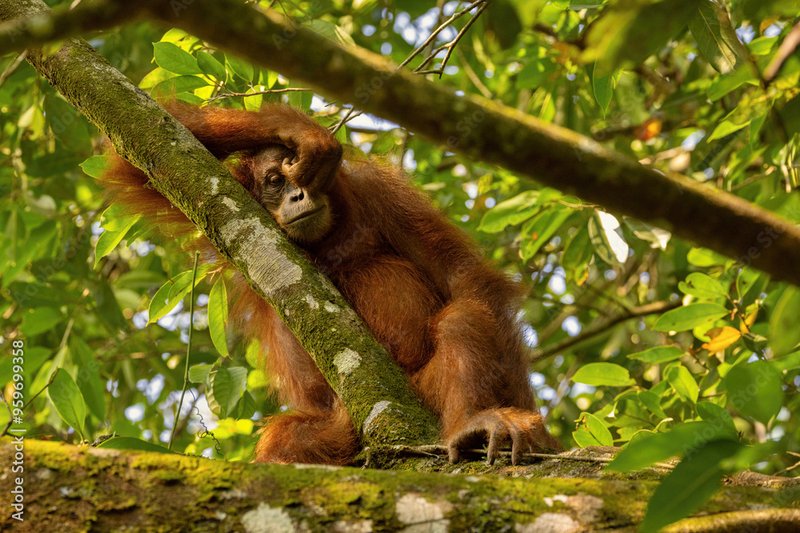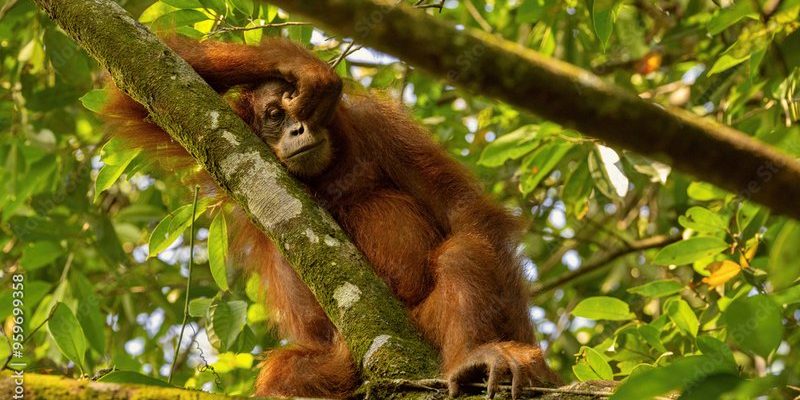
The Sumatran orangutan is native to the lush rainforests of Sumatra, Indonesia. With their long arms and intelligent expressions, they spend most of their lives in trees, swinging from branch to branch. But their influence goes far beyond just being a charming sight for tourists. By understanding their role, we can appreciate not only the orangutans but also the rich tapestry of life in the tropical forests of Southeast Asia.
Why Sumatran Orangutans Matter
Let’s start with the basics: why should we care about Sumatran orangutans? These primates are often described as “ecosystem engineers.” What does that mean? Well, when orangutans move through the treetops, they help to spread seeds from the fruits they eat. Here’s a fun analogy: think of them as nature’s delivery drivers. When they munch on fruits and berries, they inadvertently carry the seeds to new locations, aiding in plant reproduction and promoting forest growth.
This natural process contributes to biodiversity. More plant species mean a healthier ecosystem, which can support a variety of wildlife, from insects to large mammals. Without the Sumatran orangutans, there would be fewer plants, and that could lead to drastic changes in the habitat. You might be wondering how this affects us—healthy forests help regulate our climate, purify our air, and provide resources for people living nearby.
Seed Dispersal: Nature’s Delivery Service
As I mentioned, orangutans play a big role in seed dispersal. But how does that work? When these primates feast on fruits like durian or rambutan, they consume the seeds along with the tasty flesh. Once these seeds are in their bellies, they travel through the orangutan’s digestive system. After a while, they are excreted in a different spot, often far from the original tree.
This helps ensure that plants don’t compete with each other for resources. For example, if one type of tree dominates a certain area, it can reduce the overall health of the forest. But with the orangutans transporting seeds, we see a more varied plant life. This diversity creates a more resilient ecosystem, one that can bounce back from disturbances like storms or disease.
Habitat Preservation and Ecosystem Stability
Now, let’s talk about what happens when we lose Sumatran orangutans. Unfortunately, due to habitat destruction from logging and agriculture, orangutan populations are declining. Without these primates, the balance in their ecosystem is thrown off. Fewer orangutans mean fewer seeds spread across the forest, which impacts plant species and, ultimately, the animals that depend on those plants for food and shelter.
This chain reaction can lead to a less stable ecosystem. I like to think of it as a house of cards: if you remove one card from the bottom, the whole structure may collapse. That’s why preserving orangutan habitats isn’t just about saving these beautiful creatures; it’s about saving their entire ecosystem, which is crucial for the health of our planet.
Interactions with Other Species
Sumatran orangutans don’t only influence plants—they also interact with other wildlife. They share their homes with various animals, including birds, insects, and other mammals. This interaction creates a complex web of relationships. For instance, when orangutans feed, their discarded fruit peels and seeds provide food for other organisms, like insects or small mammals.
Think of it like throwing a party: the orangutans may be the hosts, but everyone else is invited to enjoy the leftover snacks. This interdependence is vital for maintaining the ecosystem’s health. The loss of orangutans could mean fewer food sources for other species, leading to a ripple effect throughout the food chain.
The Impact of Climate Change
You might be aware that climate change is a pressing global issue. But did you know that Sumatran orangutans are affected by it too? As climate change alters weather patterns, it impacts the growth of plants that orangutans rely on. If food becomes scarce, orangutans may struggle to find enough to eat, which can lead to lower reproduction rates and higher mortality.
The consequences of climate change on these primates also extend to their role in the ecosystem. Reduced seed dispersal and habitat degradation can make it even harder for forests to thrive. This is just another reason why preserving both the orangutan and their habitat is crucial—not just for them but for the health of the entire planet.
Conservation Efforts: What We Can Do
So, what can we do about all of this? Fortunately, there are numerous conservation efforts aimed at protecting Sumatran orangutans and their habitats. Organizations work to plant trees, restore degraded areas, and enforce laws against illegal logging. There are even eco-tourism programs that raise awareness about the plight of these animals while benefiting local communities.
As individuals, we can support these efforts by donating to reputable organizations, educating others, and being conscious of our consumer choices. For instance, choosing products that are sustainably sourced and certified can help reduce the demand for goods that contribute to habitat destruction.
The Future of Sumatran Orangutans
The future of Sumatran orangutans greatly relies on our actions today. These remarkable creatures are more than just another species; they are vital players in an intricate ecosystem. By understanding their role, we can better appreciate why their preservation matters. It’s like a puzzle: every piece is important, and when one is missing, the picture is incomplete.
As we move forward, let’s keep the Sumatran orangutan in mind. Their fate is tied to ours, and together we can work towards a healthier planet. In the end, protecting these incredible primates means protecting their ecosystem—and preserving a crucial part of our world.
In conclusion, Sumatran orangutans are irreplaceable in their role as seed dispersers, contributing to biodiversity and habitat stability. Their interactions with other species and the effects of climate change all underline the urgency of conservation efforts. As we strive to protect them, we can also ensure a balanced ecosystem for generations to come.

